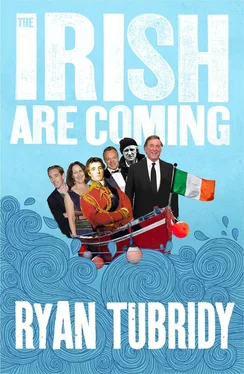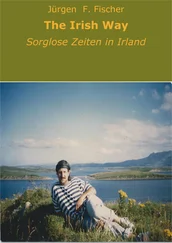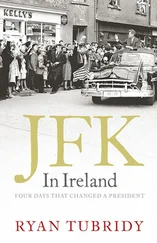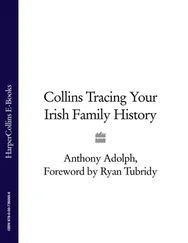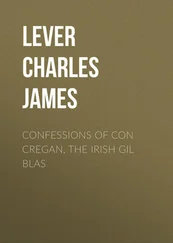But perhaps it was a sweet irony that Richard Harris had to come home to put in what many consider to be his finest acting moment – in The Field as the megalomaniac farmer Bull McCabe, whose lust for land was visible in the actor’s every fibre. Harris was trying on hats for the part when he saw the name of Ray McAnally inside one of them and realized that the great Irish actor had been earmarked for the role before he died. ‘I’m very sorry Ray McAnally died,’ Harris reportedly commented before adding, ‘But I always knew I was destined to play this part.’
Whether it was fate or luck, Harris was right and the part gave him the opportunity for a glorious final lap. Nominated for his second Oscar, Harris was back to his old self when explaining why he didn’t want to attend the Oscar ceremony: ‘Why the f**k would I want to participate in any of this Hollywood b*****ks. It’s fourteen f***ing hours there, fourteen f***ing hours back, two hours of f***ing stupidity and kissing people’s f***ing cheeks. F**k that.’ … It seems he didn’t want to go. However, Richard Harris was back in the game and had rediscovered his acting groove. The 90s proved fertile ground for the once-again sought-after actor – even though he’d started back on the Guinness. Close to his seventieth year, Harris moved into a suite at London’s Savoy Hotel where he justified the princely rent of £6,000 a week by saying: ‘If you’re paying the mortgage on a home, you can’t ask the bank manager to fetch you a pint.’
Now he was of a certain vintage, the parts offered and taken were appropriate and commanding. And so when Ridley Scott needed an imperial Marcus Aurelius, he went to Harris ( Gladiator , 2000). When the time came to find Harry Potter’s genial headmaster at Hogwarts, it was Harris they called (of which more anon). Producers and film insurance executives notwithstanding, he still enjoyed the occasional night on the lash. He once dragged Alan Rickman and Kenneth Branagh out until four in the morning and, according to Rickman, they had a ball: ‘Richard was regaling us with stories about his life, we just sat there with our mouths wide open.’
Harris was without doubt one of the finest actors of the second half of the twentieth century, a fully fledged, high-octane, booze-soaked (for the most part) Irishman who brought a swagger to the silver screen that until then had been lacking. Would he have won more acclaim if he’d curbed what he termed his ‘excessive-compulsive’ nature? Did he care? Prosaic in his analysis of the acting world, Harris commented shortly before he died: ‘Actors take themselves so seriously. Samuel Beckett is important, James Joyce is – they left something behind them. But even Laurence Olivier is totally unimportant. Acting is actually very simple, but actors try to elevate it to an art.’ All the same, I contest that British theatre and film would have been far poorer without him. He was what they call a dangerous actor, one who brought colour, unpredictability and emotional integrity to his every role and raised the bar high for all the compatriots who would follow (as well as setting a vertiginous standard for hellraisers).
Harris may have made his home in London and bought a house in the Bahamas, but he remained a proud Irishman, Munster man and Limerick man to the end. When Munster was playing rugby, you’d often find him cheering from the stand, and he was a regular visitor to his family back in the old country. After his death in 2002, a funeral mass was held in his London home but the coffin was draped in the Irish flag. In a final flourish, his ashes were scattered in the exotic surroundings of his Bahamas home and it is there that he swirls mischievously in the Caribbean air today.
PETER O’TOOLE: the Celtic dynamo
Born 2 August 1932
God, you can love it! But you can’t live in it. Oh, the Irish know despair, by God they do. They are Dostoyevskian about it. ‘Forgive me Father, I have f**ked Mrs Rafferty.’ ‘Ten Hail Marys, son.’ ‘But Father, I didn’t enjoy f**king Mrs Rafferty.’ ‘Good son, good.’
Peter O’Toole is less Irish than Richard Harris in many respects because Harris lived in Ireland till adulthood whereas O’Toole was only a boy when the family emigrated to the UK. But although he had an English accent and took British roles, he always played the Irish card – and when it came to hellraising he was destined to be the last man standing.
O’Toole’s father moved the family from a ruggedly desolate part of Connemara to a Leeds working-class housing estate – what O’Toole later called ‘a Mick community’ – in search of a better and brighter future. Full of Irish ex-pats and hard-nosed working men, as streets go these were meaner than average. Three of his childhood friends would later be hanged for murder. This was no gilded cage and yet a cursory look at the O’Toole parents gives us some insight into what was to come. Dad, Patrick Joseph O’Toole, was an illegal gambler with a fondness for alcohol and Mum, Connie, loved literature and read stories to young Peter when he was a boy. And so, hailing from Ireland’s wild west, reared in a tough part of town in a home that mixed literature and booze with a whiff of rebellion, the foundation stone of the house that Peter would build was laid very early on.
Not unlike Richard Harris, the man who would ride shotgun with him later in life, O’Toole was a poorly child, afflicted as he was with TB, a stammer and poor eyesight. And during his school days he felt the wrath of religious rigour, with nuns who tried to beat him out of left-handedness. O’Toole dedicated a corner of his autobiography to the women in black who tormented him as a youngster, describing the day they went for him after he drew a picture of a horse urinating: ‘Flapping, frantic as startled crows, rattling beads and crucifixes, black hooded heads, black winged sleeves, white celluloid breasts, hard, white bony hands banging, the brides of Christ got very cross indeed.’ Sounding more and more like Alex or one of his droogs in A Clockwork Orange , he continues: ‘They tore up my drawing and began to hit me. This made me more cross than those sexless bits of umbrella could ever be so I joined the dance and hit and tore. ’Tis only a gee-gee having a wee-wee you cruel, mad old ruins.’
Later in life, when he criticized the Catholic Church in general and his Catholic upbringing in particular in an interview in Playboy magazine, O’Toole was surprised to receive a sackful of post from angry priests and nuns: ‘They were shocked. I wrote back saying I was shocked – what were they doing reading Playboy ?’
But back to his younger, less sinful days: O’Toole left school early and earned a crust by packing cartons at a local warehouse before landing a job at the Yorkshire Evening News , his local paper, where he went from tea-boy to journalist to bored wannabe: ‘I soon found out that, rather than chronicling an event, I wanted to be the event.’
Abandoning journalism, he looked to drama as a potential path before being grabbed from his nascent career by a stint of National Service that saw him joining the Royal Navy as a signals operator. This unlikely nautical adventure was followed by a further bid for theatrical glory. Aiming for the top, O’Toole tried his hand at the Royal Academy of Dramatic Art (RADA) but was refused entry on the basis of his academic shortcomings. The flighty would-be actor blew his top and the tirade was fortuitously overheard by RADA principal Sir Kenneth Barnes, who set up an audition that O’Toole passed, resulting in a place at one of the world’s foremost theatre schools. It wasn’t long before the lithe Irishman was treading the boards and propping up bar counters around London.
Читать дальше
